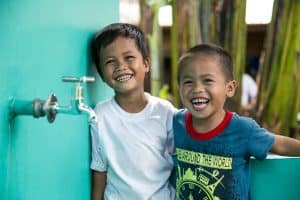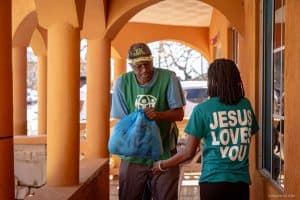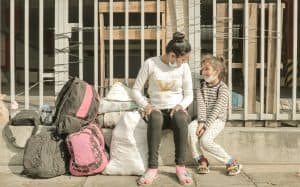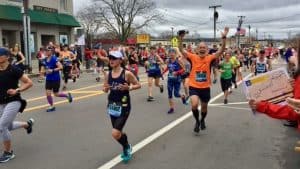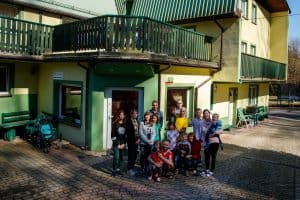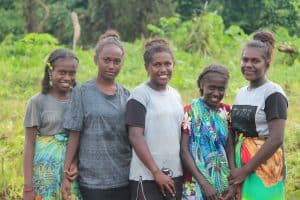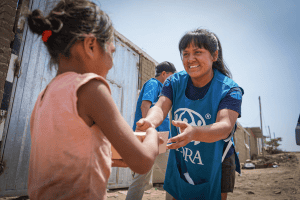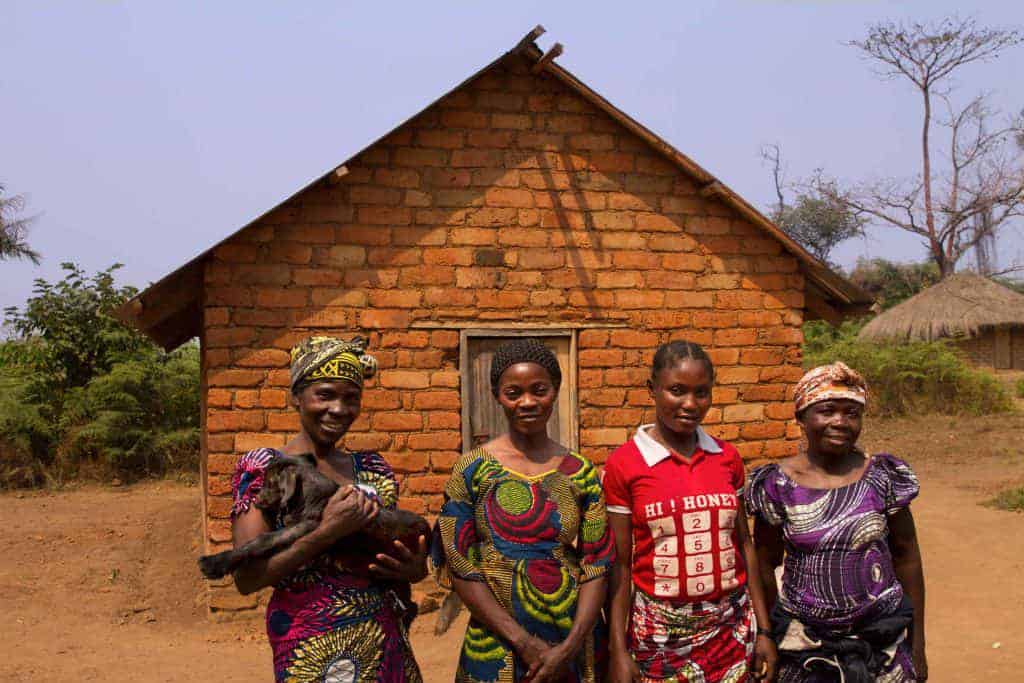
Rosalina remembers a time when she could not afford to send her son to school. For lack of funds, the 13-year-old boy was stuck at home, with no opportunities except manual labor.
Rosalina also remembers when ADRA delivered a small herd of goats to Honokuma, her remote village in the mountains of eastern Democratic Republic of Congo. The goats were brought as a business opportunity for the local ADRA-supported Women Empowerment Group of 25 women, of which Rosalina was a member.
In the beginning, she did not understand the power of those ten little goats. But in the coming months, Rosalina would learn firsthand how goats can overhaul a local economy, elevate gender equality, and transform an entire community.
When most people see a goat, they see a cute barnyard animal. When ADRA sees a goat, we see an investment. Here are 6 ways goats change lives.
1. Goats Keep Giving
When goats breed, they make more goats. When those goats breed, they make even more goats. Within a few months or years, a small herd becomes a large family.
In Honokuma, it didn’t take long for the original ten goats to start making kids (that’s what you call a baby goat). Within a year, those little kids weren’t so little anymore, and the grownup billies and does (male and female adult goats) were ready to start families of their own.
When Rosalina first saw those original ten goats, it was hard for her to understand how so few animals could help the 25 women in her group, let alone transform the entire community.
Within a few months, however, she saw the herd grow in size. Thanks to the goat rotation system that ADRA implements, in which goats are bred and the offspring distributed, each woman in her empowerment group soon had a kid of her own. In conjunction with ADRA’s business training, Rosalina was beginning to see the real value of these goats.
2. Goats Earn Money
It did not take long for Rosalina to learn a big lesson: breeding those fuzzy, bleating creatures is very lucrative. Once each of the 25 women had a goat of her own, and access to other goats for breeding, they were free to sell any future offspring for money. And the money was more than any of the women had ever earned.
When her doe had reached maturity, Rosalina bred it with a billy goat and welcomed her first kid into the world. Before, the kids were redistributed to women who had not yet received a goat. Now that all the women in the group had goats, Rosalina owned everything her goat produced.
So Rosalina sold her furry investment for the equivalent of $50 USD. Soon after, she sold two more and had enough money to enroll her son in school. Now, her son is a student instead of an out-of-school statistic.
And the goats keep on breeding. Thanks to the supplementary business training, Rosalina has learned how to save and how to invest her money. Now, she does not depend on goats alone, but on additional income-generating activities, such as farming, made possible by the funds from her goats.
3. Goats Provide Nutrition
The reason goats bring in $50 USD in Honokuma is because they are very valuable. Milk from a goat has more protein, calcium, vitamins A and B6, potassium, fat and calories than cow milk, with less carbs and lactose. In addition, goat milk can be used to make cheese and yogurt for further dietary diversity.
4. Goats Elevate the most Vulnerable
Before ADRA implements programs, we conduct what is called a needs assessment. In short, it is a way for humanitarian development professionals to work with a person, group, or community and determine the type, depth, and priority of the needs. ADRA needs assessments typically look at factors such as household composition and size, income, ability, access, education, and more. For example, a child-headed household of six people bringing in $500 USD per year in a drought-prone region would have more urgent needs than a two-income family of four living comfortably in an urban area.
In the case of Rosalina, she was an illiterate woman dependent on her husband’s meager farming income. In her remote community, there was limited access to income-generating activities, no adult education, and vast gender disparity. Simply stated, she had few opportunities for success.
Now that she has goats, and the subsequent potential for additional income and opportunities, Rosalina is no longer pushed to the bottom of society.
5. Goats Empower Women
In her culture, Rosalina had traditionally been relegated to the role of wife and mother. She depended on her husband for everything and was valued primarily as a caregiver.
Now that she brings in money of her own, that restrictive role has begun to change.
“I am not just here to give birth,” Rosalina said. “I can contribute financially, too. My husband sees that, and he respects me for it.”
That respect is newfound and hard-won. And it does not stop with Rosalina. The other women in her empowerment group have noticed a similar change in the men.
“Even our husbands will come and ask for money,” said Eunde, a friend of Rosalina and member of the empowerment group.
This dramatic shift in cultural norms has allowed the women to take on leadership roles in a historically paternal community. Increasingly, women have more say over their money, their children, and their income activities.
And the men are welcoming the shift with open arms. Bitomwa is chief of Honokuma, and he has observed the growing success of the women. Though he, too, was raised in a society that once valued the primacy of men, he does not resist the equality of women.
“The women have learned how to manage goats,” the chief said. “Now they are teaching us.”
6. Goats Build Momentum
ADRA does not give aid and leave. ADRA partners with people and communities around the world to implement generational change.
In the case of Rosalina and her friends in the empowerment group, the journey with ADRA includes goats, but it did not begin or end with goats.
The very first time Rosalina learned about ADRA was during the needs assessment in her community, when it was learned that she could not read or write. She and 24 other women were provided an opportunity to come together as a unified body and change their traditional trajectory.
For one year, the 25 women of the Women Empowerment Group learned literacy and numeracy. In most parts of the world, a woman who cannot read, write, or work with numbers is a woman with few opportunities.
Once the women developed a fluency with words and numbers, they were given their first business opportunity: goats.
But the development did not end there. Together, the women continued to learn skills in business, money management, and agriculture. The more they learned, the more they earned.
Dina is another member of the empowerment group, and she has seen her earning potential skyrocket.
“I was always depending on my husband for money,” she said. “But once I sold my goat, I paid workers to plant cassava and maize. Now, when I sell my goats, I make money. When I sell my harvest, I make money. I will continue to expand my farming operation thanks to my goats.”
What began with a one-year adult literacy class continues to transform the community today.
Today the women of Honokuma are business owners, community leaders, and mentors. They help shape society, set a model for other women and girls, and prove to men that when women succeed, everyone succeeds.
Leyi is a friend of Rosalina, and the elected leader of the Women Empowerment Group. She loves having a sisterhood of like-minded women who all come together for the sake of their families, their goats, their crops, their houses, and themselves.
“The participation makes the income generating easier,” she said. “All important decisions are made together. Together we will succeed.”


